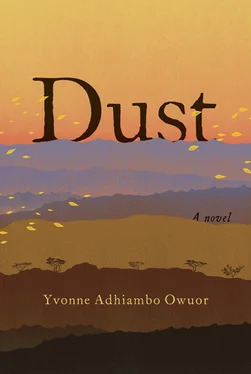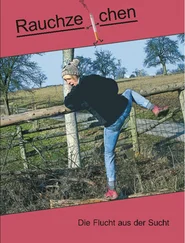Stupid boy .
If the lad had needed easy money, he should have become a parliamentarian; he could have raised his salary daily. Petrus blinks. He had tried. Had even arranged for Ali Dida Hada to move into police headquarters on a promotion, the better to monitor the case, locate Odidi, and spirit him back to Wuoth Ogik. A life for a life , he had intended to write to Nyipir after Odidi reached home. There are now no transactions pending between us .
Atonement denied by seven minutes.
Stupid boy!
Petrus studies Ajany’s bony face, the sunken, dark-rimmed eyes. He resumes his pacing, feeling sweat patches on his body, stopping to touch the wall tiles, then curtains, picking up another magazine. A twinge. So he frowns at Jos, who knocks over a file. Colorful papers flutter to the ground. Petrus grins. Human beings! Usually guilty about something or other. Usually afraid their secret had been discovered. Funny creatures.
A gnawing sensation in Ajany’s stomach as she watches Petrus.
He turns. “Gun battle; Odidi lost.”
Stillness. Her arms cradle her body.
A whisper: “You murdered my brother?”
“No.”
“Then who?”
Petrus pops his knuckle. “Some police.”
“You are p-police.”
“Yes.”
“So?”
“Odidi was a key figure in a crime situation.”
“My brother?” Scorn in every word. “Think again!”
“We did.”
“And?” Ajany glowers, standing.
Petrus gesticulates. “Sit down.”
Jos’s papers rustle.
Teeth gritted, Ajany says, “Yesterday, I saw a man shot for wearing a p-policeman’s uniform. He died on a cement pavement alone, surrounded by people treating him as they might an insect. He c-cried tears of blood. Nobody wept with him. He was — what? — twenty-four, and k-killed for wearing a p-police uniform.” Her voice descends an octave. “Erased, as if he n-never existed. Why? Doesn’t his life matter?” Her voice breaks. She stops, her breathing shallow.
Petrus’s eyes slant. “He chose death.”
“That’s it?”
“Every crime story begins with a decision.”
“And a finale that is a d-death sentence?”
“It happens.” Petrus positions his hands behind his head.
“A summary execution.”
“Maybe he attacked our officers. Maybe he was resisting arrest. Maybe he was a mad dog? A terrorist. Maybe he was planning a raid. We have a million reasons, nyar Oganda. And we can apply these to you, too.” In his soft voice, Petrus asks, “Therefore, madam … would you like to make an official statement about everything you know about this police impersonator?”
Stillness.
Ajany’s knees shake. She reaches for the chair. Her ear aches. The world looks foggy now.
“Would you?”
Ajany’s shoulders droop.
“We can go to the station now. I’ll say we have a witness, a person of interest who has details about a criminal who has been impersonating policemen with a view to committing heinous crimes. Come with me.”
“N-no.”
“No what?” Petrus asks.
“I d-don’t want to make an official statement.” Her nose is bleeding. She shields her face. Ebb and flow of shame: humiliated by this hideous solitude. “He must have had dreams.…” Her voice is tiny.
“Who?”
Silence.
Petrus wipes his forehead. “We all do … at some point.”
Petrus had turned up seven minutes after the ambush against Odidi had been sprung and an unnecessary gun battle had reached its end. He had watched Odidi struggle to get up. Then the media had shown up, as did the Officer Commanding Police Division, reciting from an unchanging script. When the show was over, Petrus had pulled rank and taken charge of Odidi’s body.
He had spoken to the young man, lying with blood-streaming eyes half open, limbs twitching, and mouth open: “I’ve looked for you, boy.”
The boy had attempted a laugh.
“I’m here,” Petrus had said.
The boy’s look had scorched Petrus’s soul and punctured an inner sac of buried tears. “Go to sleep,” he had told him, had called him “son,” and had come close to praying right there.
Afterward, when he stood up, Petrus’s first thought was to make the corpse disappear and spare Nyipir Oganda the news of his son’s death.
He had escorted the body to the mortuary and had it tagged, Unknown African Male . Petrus had then wandered into a downtown bar behind River Road where accordions played mugithi tunes, rising and falling, while gibbering patrons took on the character of shadows.
Later.
A gargantuan brown-box 1970s television had sputtered the signature tune for the 7:00 p.m. news bulletin while he studied the beer froth. A protuberant nose had appeared, a most stupendous organ, which collapsed on a pockmarked face, darkened to blue by bad lighting. With eyes bulging, a chunky neck popped out of the gray khaki uniform of the state’s potbellied police spokesman. Gloveless, he cradled a rifle, fondled a bullet; sleight of hand revealed the black.45 that had served such occasions for more than twenty years.
The spokesman’s blurring and piercing words, displacing consonants with microtones unheard of before or since — he had left no vowel unturned. “Our mboys ”—the man had pounced upon phrases, made an adjustment—“our ’eroic mboys accosted a notolious , viorent gang .…”
The image on the screen. A green Toyota Prado, banged up by bullets, windscreen shattered, bloodstains on the driver’s seat. A commentator’s hysterical voice-over: “The victim, a prominent businessman who owns an engineering firm, is recovering from bullet wounds to his neck at a private hospital in Nairobi.”
“Our mboys …” attempted the police spokesman.
Petrus, the drinking man, had glimpsed the distorted shape of a man leaning against a white saloon on television, and then spilled his beer when he recognized himself. Petrus had stared at the image of tarmac, two AK-47s, rounds of ammunition, and two pistols on the scene and listened to the OCPD’s tale: “These climinals moved with the plecision of rocusts. They swarmed their targets.” A swarming gesture. The image cut to blue socks on the soles of Odidi’s feet. Showed a stained white tight-fitting T-shirt. Blood pooled, and there was the shoelessness of a big man’s muscular body.
An open palm, the slow curling of fingers inward.
It had been so many years since Petrus had cried. This is how we lose the country, one child at a time . Two hours before dawn, breathing off the bliss of several downed Tuskers, a normally hypervigilant security man walked in an unnaturally straight line. All the way to the top of Kirinyaga Street, he howled in off-key, an unlit cigarette clinging to the insides of his mouth: Hasira za nini wee bwana … wataka kuniua bure baba … sina makosa, wee bwana .… What’s this rage? Why kill me for nothing? I’m not at fault, man.
He had thought, All my life I’ve been enforcing silence by chopping off noisy human parts . His face was distorted by a rictus of self-mockery. A mere class prefect , fwakni, in a derelict school where every headmaster is a murderous pickpocket .
Even as Petrus leaned over the ramparts of the bridge over the Nairobi River and dropped a pistol and broken phone into the murky waters, he improvised: Petrus is not at fault, bwana .… Voice fades to silence. The braying of a distant, late arriving city-bound train. Petrus walks. He steps over a creature pressed like black cardboard into the road, and for a moment remembers Nairobi’s extinct hedgehogs — why they had not survived the city’s infested sprawling.
Читать дальше











